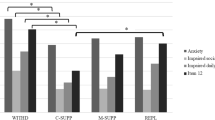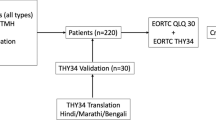Abstract
Although quality of life (QoL) has become an important aspect of cancer rehabilitation, psychometric studies on thyroid cancer patients are rare. We performed a case-controlled study on QoL in patients with differentiated thyroid carcinoma (DTC). QoL was evaluated in 61 patients with a history of DTC diagnosed from <1 to 23 yr earlier. An undetectable thyroglobulin (Tg) level after recombinant human TSH (rhTSH) testing was considered the best predictor of cure. QoL was evaluated by means of a general psychiatric interview, the self-rating Kellner Symptoms Questionnaire (KSQ) and the Hamilton Depression Scale (HDS). QoL was also evaluated in a control group of subjects on L-T4 therapy with a non-toxic multinodular goiter diagnosed from <1 to 25 yr earlier. DTC and control subjects were similar in age, male-female distribution and concomitant psychiatric therapies. Per-week dosage of L-T4 was higher in DTC patients than in controls (p<0.01). In neither group of subjects was there any correlation between current TSH levels or interval from diagnosis and KSQ or HDS scores. Only in DTC patients was there a positive correlation between age and KSQ (p<0.05) or HDS (p<0.01 ) scores. There was a significant difference in overall KSQ scores between DTC (33.4±2.1) and control (24.5±1.9; p<0.01 ) subjects. The subscales of KSQ showed a significant inter-group difference. HDS scores were higher in DTC subjects (35.8±1.0) than in controls (30.0±1.1; p<0.01). HDS score was significantly (p=0.02) higher in female than in male DTC patients. In patients with papillary carcinoma there was a positive correlation between the MACIS (metastases, age, completeness, invasiveness, size) score and KSQ (p=0.01) or HDS (p<0.01) scores. After rhTSH testing, detectable Tg levels were found in 13% of DTC patients. In Tg-positive patients, KSQ and HDS scores were not different from those of Tgnegative patients. After an 8–14 month period, a significant decrease in the KSQ scale somatization p=0.02) was found in a sub-set of 31 DTC patients. In conclusion, even in the age of rhTSH testing, DTC patients suffer an impairment of their QoL, as noted when short-term L-T4 withdrawal was the gold standard. Longitudinal evaluation seems to indicate a slight improvement in QoL when safe rhTSH testing is extensively used in the management of the disease.
Similar content being viewed by others
References
Sherman SI. Thyroid carcinoma. Lancet 2003, 361: 501–11.
Gilliland FD, Hunt WC, Morris DM, Key CR. Prognosticfactors for thyroid carcinoma. A population-based study of 15, 698 cases from the Surveillance, Epidemiology and End Results (SEER) program 1973–1991. Cancer 1997, 79: 564–73.
Schlumberger MJ. Papillary and follicular thyroid carcinoma. N Engl J Med 1998, 338: 297–306.
Schlumberger M, Pacini F. Epidemiology. In: Schlumberger P, Pacini F eds. Thyroid tumors. 2nd ed. Paris: NucléoN. 2003, 51–62.
Karavitaki N, Vlassopoulou V, Tzanela M, Tzavara I, Thalassinos N. Recurrent and/or metastatic thyroid cancer: therapeutic options. Expert Opin Pharmacother 2002, 3: 939–47.
Mazzaferri EL, Robbins RJ, Spencer CA, et al. A consensus report of the role of serum thyroglobulin as a monitoring method for low-risk patients with papillary thyroid carcinoma. J Clin Endocrinol Metab 2003, 88: 1433–41.
Schlumberger M, Berg G, Cohen O, et al. Follow-up of low-risk patients with differentiated thyroid carcinoma: a European perspective. Eur J Endocrinol 2004, 150: 105–12.
Roberts CGP, Ladenson PW. Hypothyroidism. Lancet 2004, 363: 793–803.
Dow KH, Ferrell BR, Anello C. Quality-of-life changes in patients with thyroid cancer after withdrawal of thyroid hormone therapy. Thyroid 1997, 7: 613–9.
Giusti M, Zoccola R, Guazzini B, et al. Recombinant human TSH changes the multidisciplinary approach to patients with differentiated thyroid carcinoma. Two-year experience. Min Endocrinol 2003, 28: 191–203.
Robbins RJ, Robbins AK. Clinical review 156: Recombinant human thyrotropin and thyroid cancer management. J Clin Endocrinol Metab 2003, 88: 1933–8.
Pacini F, Molinaro E, Castagna MG, et al. Recombinant human thyrotropin-stimulated serum thyroglobulin combined with neck ultrasonography has the highest sensitivity in monitoring differentiated thyroid carcinoma. J Clin Endocrinol Metab 2003, 88: 3668–73.
Haugen BR, Pacini F, Reiners C, et al. A comparison of recombinant human thyroglobulin and thyroid hormone withdrawal for the detection of thyroid remnant or cancer. J Clin Endocrinol Metab 1999, 84: 3877–85.
Choen O, Dabhi S, Karasik A, Zwas SZ. Compliance with follow-up and the informative value of diagnostic whole-body scan in patients with differentiated thyroid carcinoma given recombinant human TSH. Eur J Endocrinol 2004, 150: 285–90.
Ware JE. The SF-36 health survey. In: Spilker B ed. Quality of life and pharma-economics in clinical trials. Philadelphia: Lippincot-Raven. 1996, 337–46.
Cravenna R, Zetting G, Keilani M, et al. Quality of life in patients with non-metastatic differentiated thyroid cancer under thyroxine supplementation therapy. Support Care Cancer 2003, 311: 597–603.
Golger A, Fridman TR, Eski S, Witterick IJ, Freeman JL, Walfish PG. Three-week thyroxine withdrawal thyroglobulin stimulation screening test to detect low-risk residual/ recurrent well-differentiated thyroid carcinoma. J Endocrinol Invest 2003, 26: 1023–31.
Schultz PN, Stava C, Vassipoulou-Sellin R. Health profiles and quality of life of 518 survivors of thyroid cancer. Head Neck 2003, 25: 349–56.
Hay I, Bergstralh E, Goellner J, Ebersold J, Grant C. Predicting outcome in papillary thyroid carcinoma: development of a reliable prognostic scoring system in a cohort of 1779 patients surgically treated at one institution through 1989. Surgery 1993, 114: 1050–8.
Fava GA, Kellner R. Versione italiana del Symptom Questionnaire (SQ) di Kellner. In: Canestrari R ed. Nuovi metodi in psicometria. Firenze: Oganizzazioni Speciali. 1982, 51–64.
Kellner R. Part 1. Improvement criteria drug trials with neurotic patients. Psychol Med 1971, 1: 416–21.
Hamilton M. A rating scale for depression. J Neurol Neurosurg Psychiatry 1960, 23: 56–9.
Torlontano M, Attard M, Crocetti U, et al. Follow-up of low risk patients with papillary thyroid cancer: role of neck ultrasonography in detecting lymph node metastases. J Clin Endocrinol Metab 2004, 89: 3402–7.
Webb SM, Prieto L, Badia X, et al. Acromegaly quality of life questionnaire (AcroQoL)a new health-related quality of life questionnaire for patients with acromegaly: development and psychometric properties. Clinical Endocrinology (Oxf) 2002, 57: 251–8.
Giusti M, Foppiani L, Penati S, et al. Assessment of quality of life in recently post-menopausal women on dopaminergic therapy for pathological hyperprolactinaemia. Min Endocrinol 1999, 24: 11–9
Giusti M, Meineri I, Malagamba D, et al. Impact of recombinant human growth hormone treatment on psychological profiles in hypopituitary patients with adult-onset growth hormone deficiency. Eur J Clin Invest 1998, 28: 13–9.
Rosilio M, Blum WF, Edwards DJ, et al. Long-term improvement of quality of life during growth hormone (GH) replacement therapy in adults with GH deficiency, as measured by questions on life satisfaction-hypopituitarism (QLS-H). J Clin Endocrinol Metab 2004, 89: 1684–93.
Sonnino N, Navarrini C, Ruini C, et al. Persistent psychological distress in patients treated for endocrine disease. Psychother Psychosom 2004, 73: 78–83.
Meier CA, Braverman LE, Ebner SA, et al. Diagnostic use of recombinant human thyrotropin in patients with thyroid carcinoma (phase I/II study). J Clin Endocrinol Metab 1994, 78: 188–96.
Baudin E, Do Cao C, Cailleux AF, Leboulleux S, Travagli JP, Schlumberger M. Positive predictive value of serum thyroglobulin levels, measured during the first year of follow-up after thyroid hormone withdrawal, in thyroid cancer patients. J Clin Endocrinol Metab 2003, 88: 1007–11.
Giusti M, Valenti S, Guazzini B, et al. Circulating nitric oxide is modulated by recombinant human TSH administration during monitoring of thyroid cancer remnant. J Endocrinol Invest 2003, 26: 1192–7.
Kendall-Taylor. Guidelines for the management of thyroid cancer. Clin Endocrinol (Oxf) 2003, 58: 400–3.
Author information
Authors and Affiliations
Corresponding author
Rights and permissions
About this article
Cite this article
Giusti, M., Sibilla, F., Cappi, C. et al. A case-controlled study on the quality of life in a cohort of patients with history of differentiated thyroid carcinoma. J Endocrinol Invest 28, 599–608 (2005). https://doi.org/10.1007/BF03347258
Accepted:
Published:
Issue Date:
DOI: https://doi.org/10.1007/BF03347258




